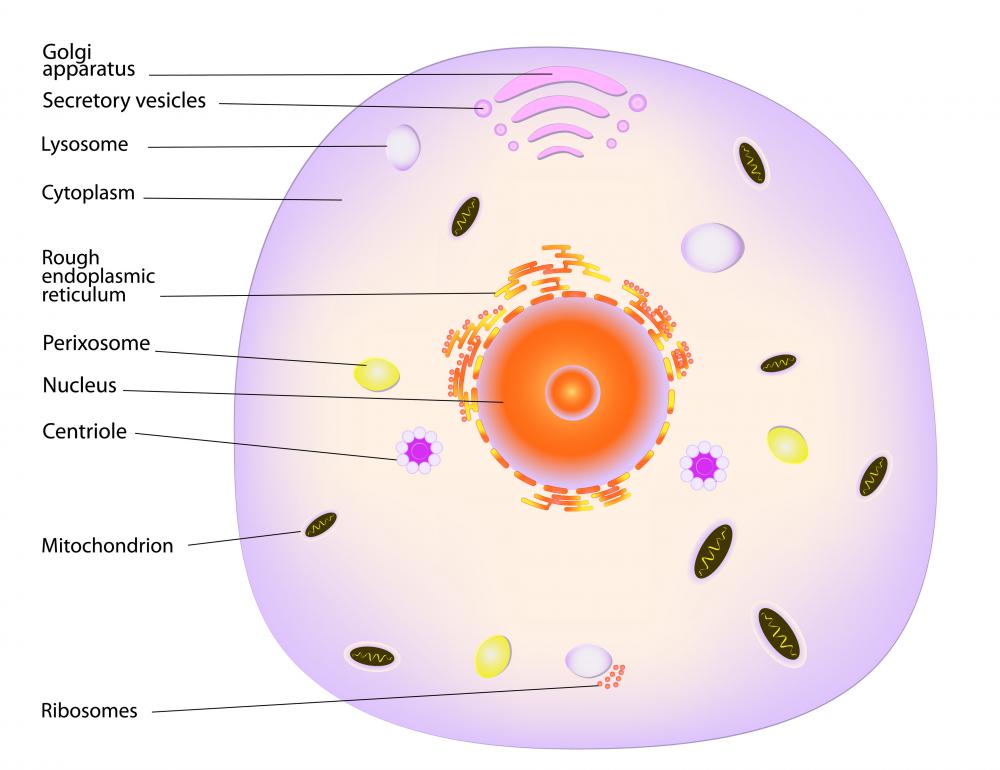At WiseGEEK, we're committed to delivering accurate, trustworthy information. Our expert-authored content is rigorously fact-checked and sourced from credible authorities. Discover how we uphold the highest standards in providing you with reliable knowledge.
What are Antimitochondrial Antibodies?
Antimitochondrial antibodies (AMA) are autoantibodies, or antibodies against the self, that target mitochondria. A mitochondrion is an organelle, or a structure within a cell, that helps to manufacture cellular energy, monitor cell growth, and cause cell death, amongst other functions. An antibody is a protein called an immunoglobulin that works with the immune system to locate and disarm damaged cells and foreign objects, such as viruses or harmful bacteria. In a healthy patient, the immune system provides several crucial defense mechanisms for the body, but when the immune system mistakenly turns against healthy tissues in the body, it can cause serious illnesses known as autoimmune disorders. The presence of antimitochondrial antibodies in the blood indicates an autoimmune disease, such as primary biliary cirrhosis (PBC), rheumatoid arthritis, autoimmune hepatitis, systemic lupus erythematosus, or thyroiditis.
An antibody is a protein composed of two heavy polypeptide chains and two light polypeptide chains that form a “Y” shape. The trunk of the “Y” is the constant region, of which there are five classes, or isotypes, that control how the antigen is destroyed and how the immune system should respond. An antigen is the target of the antibody, or mitochondria in the case of antimitochondrial antibodies. The two arms of the “Y” form the variable regions of the antibody, which include hypervariable regions and antigen binding sites. The antigen binding sites are specially formed, either through random composition or in response to an immune reaction, to recognize a very specific antigen, then bind to it and destroy it.

In a healthy body, a mechanism called immune tolerance prevents the body from attacking certain antigens, such as the body’s healthy tissue. Antibodies that fail to recognize self and try to attack healthy tissue are removed from the system. Some external antigens, or non-self antigens, such as an organ transplant or a fetus in a pregnant woman, require an immune system mechanism called acquired tolerance.

The presence of antimitochondrial antibodies in the body’s fluids implies that the immune system has lost its tolerance of mitochondria, or lost its ability to recognize mitochondria as part of the self. These antibodies then target a protein found on an enzyme complex, called pyruvate dehydrogenase complex- enzyme 2 (PDC-E2), in the inner lining of mitochondria. Oftentimes, mitochondria in the liver are most affected.
Autoimmune hepatitis occurs when the immune system attacks the liver, causing inflammation, or swelling, and cirrhosis at late stages. Cirrhosis refers to the scarring of liver tissue, which may lead to impaired liver function. Autoimmune hepatitis presents symptoms of dark urine, pale stool, fatigue, loss of appetite, general itching sensation, nausea, and abdominal swelling and usually arises in young females with family history of the disease. A positive blood test for antimitochondrial antibodies, amongst other signs, is often used to diagnose this disease.
The AMA blood test may also be used to diagnose primary biliary cirrhosis (PBC). For unknown causes, PBC irritates the bile ducts in the liver, causing inflammation, and then blocking of the bile ducts. This obstruction then causes cell damage in the liver and eventually cirrhosis. This disease primarily arises in middle-aged females and presents symptoms of jaundice, belly pain, itching, abdominal swelling, fatty stools, and collection of fat under the skin.
AS FEATURED ON:
AS FEATURED ON:












Discuss this Article
Post your comments